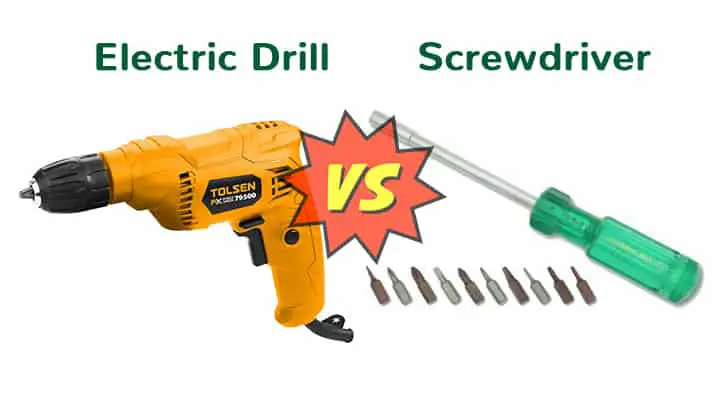I love creating free content full of tips for my readers, you. I don't accept paid sponsorships, my opinion is my own, but if you find my recommendations helpful and you end up buying something you like through one of my links, I could earn a commission at no extra cost to you. Learn more
No doubt that driving screws or drilling holes is a tiring job but if you have a tool with which you can complete the job easily within a short time isn’t it wonderful? Well, an electric drill and screwdriver are such tools that made the tiring job of driving screws or drilling holes easier and faster.

In this post we'll cover:
7 Major Differences Between an Electric Drill and Screwdriver
1. Torque
An electric drill can generate more torque compared to an electric screwdriver. Since high torque means the tool can accomplish more difficult tasks if you have to do heavy-duty work then an electric drill is the right choice for you. On the other hand, if you want a neat finishing you cannot achieve that target with a drill as it generates high torque and works vigorously; in that case, you have to choose the electric screwdriver. So, the capability of generating high torque does not mean that a drill is better than a screwdriver. It depends on the job you intended to do with the tool.2. Size
Electric screwdrivers are smaller than drills. There are many models of screwdrivers available in the market that will fit in your pocket. But the drills are bigger and you cannot carry those in your pocket because a larger and more powerful motor is used in the electric drills.3. Weight
The drills are heavier than the screwdriver. On average, most electric drills weigh 3.5-10 pounds. On the other hand, the electric screwdrivers weigh less than a pound. So, the weight difference between a drill and a screwdriver is huge.4. Portability
Since screwdrivers are smaller in size and weigh less you can easily carry them to the worksite. On the other hand, the electric drills are bigger and heavier which made them difficult to carry from one place to another.5. Fatigue during Work
It is easily understandable that if you work with a heavy and bigger tool you will be tired soon. On the other hand, you can work for a long time with a smaller and lightweight tool. So, it is more comfortable to work with a screwdriver than an electric drill.6. Flexibility
Many models of electric screwdrivers feature adjustable angled heads and let you work in tight spaces. The electric drills won’t give you as much flexibility as an electric screwdriver but their flexibility is limited by the light-duty work such as – drilling small holes in softwood.7. Cost
Electric drills are expensive than screwdrivers. But it is not possible to provide you a big and powerful tool at the price of a small and less powerful tool.Final Words
To DIY lovers or homeowners, an electric screwdriver is a favorite tool as they do light-duty work. But if you are a professional and need to work on construction sites an electric drill is a right choice for you. The decision is yours – our responsibility is to provide you the necessary information so that you can make the right decision. We have done our part, now it is time to do your part.I'm Joost Nusselder, the founder of Tools Doctor, content marketer, and dad. I love trying out new equipment, and together with my team I've been creating in-depth blog articles since 2016 to help loyal readers with tools & crafting tips.
